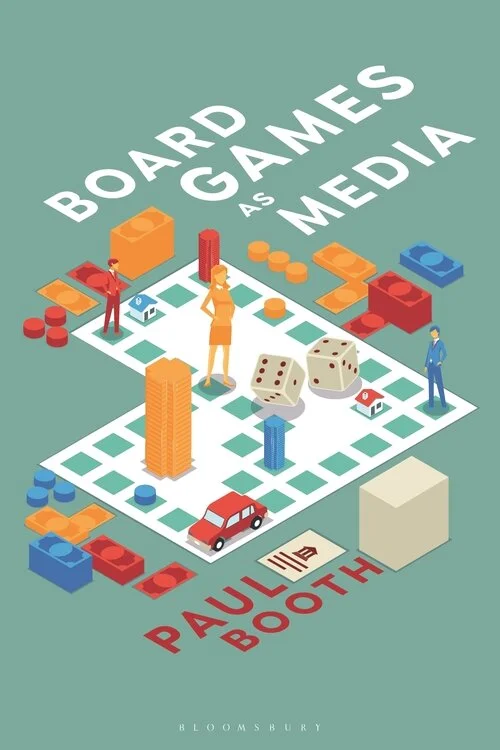Manifestations of Queerness in Video Games positions video games alongside queer fixtures, such as drag, cyborgs, sissies, flânerie, monsters, and the latent homoeroticism of wrestling. Together with Bonnie Ruberg’s (2019) Video Games Have Always Been Queer, Gaspard Pelurson’s monograph serves to become a foundational text in the now flourishing discourse of queer game studies. Video games are typically understood through mastery, competition, capital, and production; however, through queer thinking, they become sites of hope, failure, fragility, and erotics. Where Ruberg proves there is queerness in every game and every game can be queered, Pelurson presents queer manifestations, how you might find them, and how subversive, disruptive, and arousing they can be should you catch a glimpse.
Read MoreAs its title suggests, Gordon Calleja’s Unboxed: Board Game Experience and Design, published by MIT Press in 2022, offers an exploration of player experience and the ways in which game designers work to create those experiences. Calleja draws on interviews with thirty-two leading board game designers and critics, and the inclusion of the insights of these well-known designers (alongside a wide range of scholarly material) results in a book that is extremely readable, while offering in-depth discussions of games and game design, and practical in turning these discussions towards game making and game playing.
Read MoreHistoria Ludens explores the multiple ways in which games, history, and historians intersect and interact. The chapters examine how games (primarily videogames, but not only) represent history, as well as how play can be introduced into teaching; as the editors note in their preface, “history can be understood as a form of playing” and “playing poses intriguing methodological and theoretical potential” (p. xiii). The sixteen chapters are divided into six sections, the order of which this review follows, but it is notable that these categories are somewhat amorphous and there are numerous points of contact between papers throughout the volume.
Read MoreIn this blog post, Man Met Game Centre member Jennifer Cromwell reviews Role-Play as a Heritage Practice by Michał Mochocki.
Read MoreIn this blog post, Man Met Game Centre member Dylan Yamada-Rice reviews A Playful Production Process by Richard Lemarchand.
Read MoreIn this blog post, Man Met Game Centre member Rob Gallagher reviews How Pac-Man Eats by Noah Wardrip-Fruin.
Read MoreIn this blog post, Man Met Game Centre member Jennifer Cromwell reviews Ancient Greece and Rome in Videogames: Representation, Play, Transmedia by Ross Clare.
Read MoreBoard Games as Media looks to be well placed to succeed in its aim to start conversations about board games. Readers already interested in board game studies will find much of interest, but those with most to gain are those new to the topic.
Read MoreRerolling Boardgames looks set to be an important volume in boardgame studies, adding to the small but growing number of books that take analogue games as their focus. Readers, whether they are game scholars, game designers, or keen players, will likely find much of interest in what is both an academically interesting and practical set of essays.
Read MoreAchievement Relocked is a fascinating and genuinely useful book that will be of great interest to anyone interested in game design, as well as to players interested in understanding some of the impulses behind their own in-game decisions.
Read MoreThis latest addition to the Playful Thinking series from MIT press is a lively political polemic and a useful survey of a wealth of feminist research on games.
Read MoreLocally Played will serve as a useful introduction to game studies scholars wishing to better understand what local community games are, and the potential roles that they can play in serving local needs.
Read MoreReaders and players with an interest in adventure games, and those interested in the genre’s many descendants, will undoubtedly find Reed, Murray and Salter’s book both useful and enjoyable.
Read MorePlaying Ecology is an essential text for anyone who is interested in better considering the role that video games can play in understanding our relationship with the natural environment.
Read MoreClassical Antiquity in Video Games demonstrates the importance of the study of video games for research into multiple areas of ancient world studies: the presentation and reception of the ancient world, how players engage with these past worlds that they inhabit, the pedagogic use of video games, and the use of virtual worlds as tools.
Read MoreEspen Aarseth and Stephan Günzel’s Ludotopia: Spaces, Places, and Territories in Computer Games is an edited collection which seeks to apply philosophical theories of space to the study of games, bringing together work begun at workshops held in Copenhagen, Denmark and Salford, UK in 2010 and 2011.
Read MoreMizer’s interesting and absorbing account asks us to take seriously the worlding practices of tabletop role-playing games.
Read MoreIn its nine chapters (plus the editors’ introduction), the book sets out to explore the long history of the association of warfare and games through readings of literary texts that range from the late-sixteenth to the early-eighteenth century.
Read MoreConsalvo and Paul present their argument as a developing story, with each chapter moving forward a few years chronologically in the period from 2010 to 2018, and focusing on the games that were at the heart of discussions at each point to draw out specific cultural themes.
Read More


















